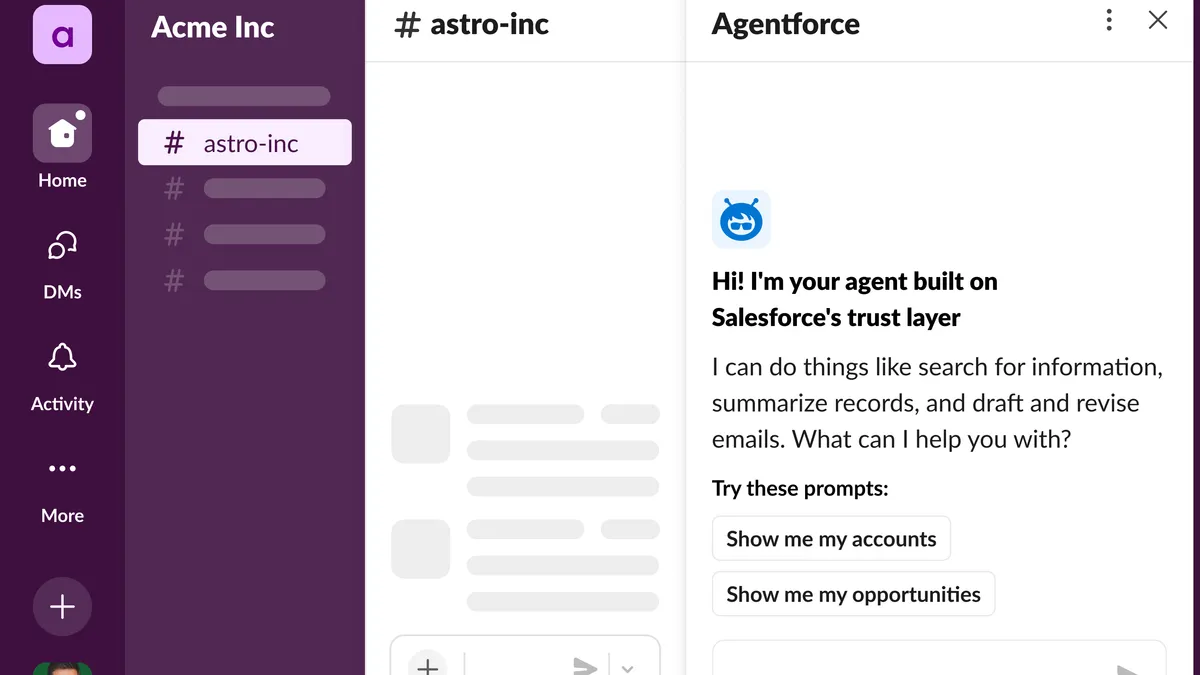Dive Brief:
- Slack is adding a set of AI capabilities to its platform, including Huddle summaries, a new workflow builder and more ways to find information faster, the Salesforce-owned platform announced during its annual Dreamforce conference Monday.
- The collaboration platform is also introducing a new user interface for Agentforce — AI-powered agents to Slack AI. The feature leverages Agentforce, formerly Einstein Copilot, to let users get answers to simple questions and automate routine tasks and actions on behalf of the user, such as scheduling appointments.
- Slack said it plans to move most of the capabilities into general availability by later this year and in early 2025. Users with a paid plan can now access Slack AI features for an additional fee.
Dive Insight:
Salesforce-owned Slack has been working to expand the capabilities of its platform beyond those of traditional collaboration solutions by embedding no-code and AI-driven features.
Amid the transformation, Salesforce appointed Denise Dresser as Slack's CEO in November 2023.
“We’ve moved beyond collaboration; every day, millions of teams are leveraging purpose-built AI, with customer data, automation and now agents seamlessly integrated into the flow of work,” Dresser said in the announcement Monday.
Enterprises are eager to gain the potential benefits that accompany AI adoption, but the technology’s risks can undercut progress if left unchecked.
“For AI in particular, I think it’s a continual challenge for the industry,” Rob Seaman, Slack SVP of product, enterprise, told CIO Dive. From an accuracy standpoint, Slack has deployed several strategies to improve outputs.
The platform added citations to generated responses to increase transparency and build trust by allowing easy validation. Customers can directly report through the product whether an answer was helpful or not. Slack is also expanding its search corpus to include files and images, which can help ground answers, Seaman said.
Slack’s approach to AI additions is part of a broader push across the vendor field to create a compelling case for adoption, often targeting complexity mitigation and efficiency boosts.
Enterprises tend to favor a multipronged approach to AI adoption, building some capabilities in-house and leveraging add-ons in existing applications. Data privacy and security are also top of mind for executives when choosing how to integrate the technology, with three-quarters worrying about the impact of partnering with third parties, according to a KPMG survey.
Tech vendors have kept a brisk pace when it comes to rolling out AI capabilities since early last year. Salesforce said AI is driving deals, more than doubling new bookings quarter over quarter, according to its August earnings report.
Other vendors have started to reap the benefits of enterprise AI interest as well. Microsoft’s Dynamics 365 platform brought in revenue growth of 19% year over year, driven in part by the addition of Copilot in its ERP and CRM business applications, according to the company’s July earnings report. SAP executives said its AI strategy played a key role in every ERP and line-of-business deal closed in the three-month period ending June 20 during an earnings call earlier this summer.














